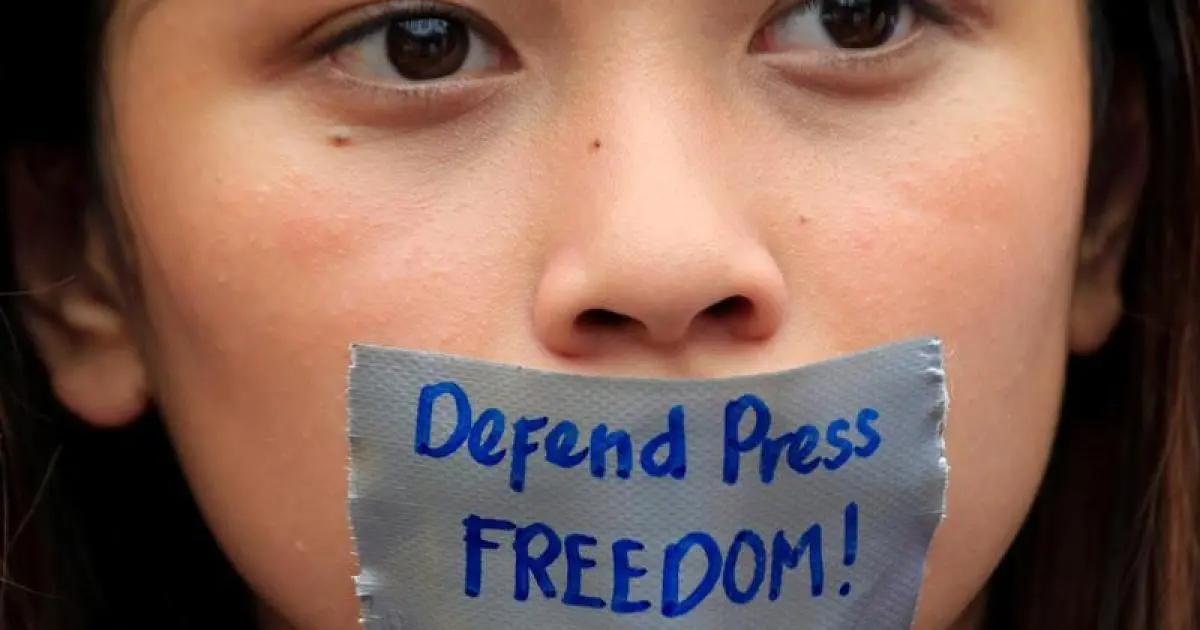The US ranks 45 out of 180 countries on Reporters Without Borders annual World Press Freedom Index, falling behind several European countries, South Africa, and Namibia for its lack of local news outlets and a growing interest in partisan media.
RWB’s annual index ranks 180 countries with five criteria: political context, legal framework, economic context, sociocultural context, and safety.
Most Middle Eastern countries and several East Asian countries fare poorly in the rankings: North Korea at 180 is ranked the worst country for press freedom, while China is ranked 179, and Vietnam 178.
RWB characterizes North Korea as “one of the worlds’ most authoritarian regimes, which tightly controls information and strictly prohibits independent journalism.”
‘Party Mouthpiece’
Of China, RWB notes: “The People’s Republic of China (PRC) is the world’s largest prison for journalists, and its regime conducts a campaign of repression against journalism and the right to information worldwide.”
Major Chinese media groups, such as Xinhua News Agency, China Central Television (CCTV), China National Radio (CNR), and newspapers China Daily, People’s Daily and the Global Times, are state-owned and directly controlled by the authorities, notes RWB.
“In the eyes of the regime, the media’s function is to be the party’s mouthpiece and to impart state propaganda. Independent journalists and bloggers who dare to report ‘sensitive’ information are often placed under surveillance, harassed, detained, and, in some cases, tortured,” alleged RWB.
Jailed Journalists
China dropped four spots from its ranking in last year’s index. After the rankings were released May 3, on World Press Freedom Day, the chairs of the bipartisan and bicameral Congressional-Executive Commission on China, Rep. Christopher Smith, R-New Jersey, and Sen. Jeff Merkley, D-Oregon, issued a statement urging the Biden administration to lead a global effort for the release of several Chinese journalists who are currently in prison.
“We honor the fierce courage and sacrifice of those in China who bravely seek to inform, expose, and educate despite intimidation, censorship, and arbitrary arrest,” wrote the congressmen.
Norway took the top spot for press freedom, with Ireland in second place. “The media market is vibrant, featuring a strong public service broadcaster and a diversified private sector with publishing companies guaranteeing extensive editorial independence,” says RWB of Norway.
US Drops in Rankings
The US dropped three spots from its ranking last year.“After a sharp rise in 2020, freedom of the press violations have fallen significantly in the United States, but major structural barriers to press freedom persist in this country once considered a model for freedom of expression,” notes RWB, which is also known as Reporters sans Frontières. Digital platforms and social media have contributed to the US’s weakening of journalism and democracy, stated the report.
Much of the country’s media is owned by a handful of wealthy individuals, disallowing a multitude of differing opinions and voices, notes the organization.
Reporter Stabbed to Death
The report also expressed concern about the safety of journalists working in the US. It cited the September 2022 murder of Las Vegas Review-Journal reporter Jeff German, who was allegedly stabbed to death by Clark County, Nevada Public Administrator Robert Telles. German had written a series of investigative stories on Telles’ misconduct while in office. He was working on a follow-up story at the time of his death.
Secretary of State Antony Blinken attended an event for the report’s release May 3. “We’re trying to fight back and push back around the world to help journalists, who – in one way or another, are facing intimidation, coercion, persecution, prosecution, and surveillance,” he said.
Digital Fake Content Industry
Clayton Weimers, Executive Director of RSF’s US Bureau, said in a statement issued after the event: “Secretary Blinken made clear it’s important for Washington to ‘walk the walk’ on press freedom. The US government has an important role to play in promoting press freedom and leading by example in upholding those values itself, and RSF will continue to hold it accountable on both fronts.”
Blinken also called for the immediate release of Wall Street Journal reporter who was arrested last March in Russia and continues to be detained on charges of spying. Blinken also said the administration is working to secure the release of Austen Tice, a freelance journalist who was kidnapped in 2012 while reporting in Syria.
RWB’s report also analyzed the impact of the “digital fake content industry.” In 118 countries, most respondents reported that political actors in their countries were often or systematically involved in massive disinformation or propaganda campaigns.
“The difference is being blurred between true and false, real and artificial, facts and artifices, jeopardizing the right to information. The unprecedented ability to tamper with content is being used to undermine those who embody quality journalism and weaken journalism itself,” stated RWB.





